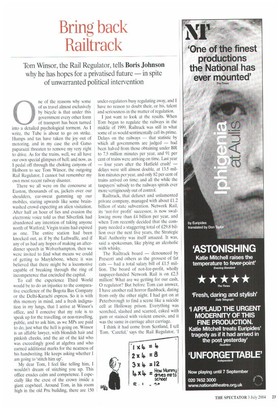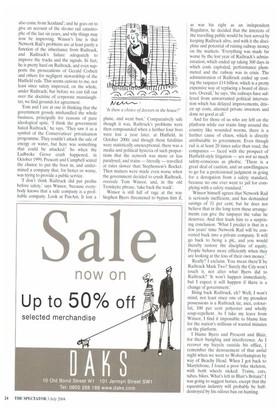Bring back Railtrack
Tom Winsor, the Rail Regulator, tells Boris Johnson why he has hopes for a privatised future — in spite of unwarranted political intervention 0 ne of the reasons why some of us travel almost exclusively by bicycle is that under this government every other form of transport has been turned into a detailed psychological torment. As I write, the Tube is about to go on strike. Humps and tax have taken the joy out of motoring, and in my case the evil Gatso paparazzi threaten to remove my very right to drive. As for the trains, well, we all have our own special glimpses of hell; and now, as
I pedal off through the choking canyons of Holborn to see Tom Winsor, the outgoing Rail Regulator, I cannot but remember my own most recent railway disaster.
There we all were on the concourse at Euston, thousands of us, jackets over our shoulders, ear-sweat gumming up our mobiles, staring upwards like some brainwashed crowd expecting an alien visitation. After half an hour of lies and evasion the electronic voice told us that Silverlink had abandoned any intention of taking anyone north of Watford; Virgin trains had expired as one. The entire station had been knocked out, as if by the Luftwaffe, and if any of us had any hopes of making an afterdinner speech in Wolverhampton, then we were invited to find what means we could of getting to Marylebone, where it was believed that there might be a locomotive capable of breaking through the ring of incompetence that encircled the capital.
To call the experience Third World would be to do an injustice to the comparative excellence of the Bogota Bus Company or the Delhi-Karachi express. So it is with this memory in mind, and a fresh indignation in my lungs, that I arrive at Winsor's office, and I conceive that my role is to speak up for the travelling, or non-travelling, public, and to ask him, as we MPs are paid to do, just what the hell is going on. Winsor is an affable lawyer, with blondish hair and pinkish cheeks, and the air of the kid who was exceedingly good at algebra and who earned additional marks for the neatness of his handwriting. He keeps asking whether I am going to 'stitch him up'.
My dear Tom, I feel like telling him, I wouldn't dream of stitching you up. This office exudes calm and competence. I especially like the crest of the crown inside a giant cogwheel. Around Tom, in his room high in the old Pru building, there are 150 under-regulators busy regulating away, and I have no reason to doubt their, or his, talent and seriousness in the matter of regulation.
I just want to look at the results. When Tom began to regulate the railways in the middle of 1999, Rai1track was still in what some of us would sentimentally call its prime. Delays on the railways — that statistic by which all governments are judged — had been halved from those obtaining under BR to 7.5 million minutes per year, and 91 per cent of trains were arriving on time. Last year — four years after the Hatfield crash! — delays were still almost double, at 13.5 million minutes per year, and only 82 per cent of trains arrived on time; and all the while the taxpayers' subsidy to the railways spirals ever more vertiginously out of control.
RaiItrack, that defunct and unlamented private company, managed with about £1.2 billion of state subvention. Network Rail, its `not-for profit' successor, is now swallowing more than £4 billion per year, and when Tom recently decided that the company needed a staggering total of £29.8 billion over the next five years, the Strategic Rail Authority was itself amazed. It was, said a spokesman, like plying an alcoholic with whisky.
The RaiItrack board — denounced by Prescott and others as the grossest of fat cats — had a total salary bill of £1.5 million. The board of not-for-profit, wholly taxpayer-funded Network Rail is on £2.5 million! What are we getting for our cash, 0 regulator? But before Tom can answer, I have another rail horror flashback, dating from only the other night. I had got on at Peterborough to find a scene like a suicide cell at Holloway prison. Everything was scorched, slashed and scarred, caked with gum or stained with violent emesis, and it was the same in carriage after carriage.
I think it had come from Scotland, I tell Tom. 'Careful,' says the Rail Regulator, 'I
also come from Scotland'; and he goes on to give an account of the slo-mo rail catastrophe of the last six years, and why things may now be improving. Winsor's line is that Network Rail's problems are at least partly a function of the inheritance from Railtrack, and Railtrack's failure adequately to improve the tracks and the signals. In fact, he is pretty hard on Railtrack, and even supports the prosecutions of Gerald Corbett and others for negligent stewardship of the Hatfield rails. This seems curious to me, not least since safety improved, on the whole, under Railtrack; but before we can fall out over the doctrine of corporate manslaughter, we find grounds for agreement.
Tom and I are at one in thinking that the government grossly mishandled the whole business, principally for reasons of pure ideological spite. 'I think the government hated Railtrack,' he says. 'They saw it as a symbol of the Conservatives' privatisation programme. They couldn't attack the sale of energy or water, but here was something that could be attacked.' So when the Ladbroke Grove crash happened, in October 1999, Prescott and Campbell seized the chance to put the boot in, and undermined a company that, for better or worse, was trying to provide a public service.
'I don't think Railtrack did put profits before safety,' says Winsor, 'because everybody knows that a safe company is a profitable company. Look at PanAm. It lost a plane, and went bust.' Comparatively safe though it was, Railtrack's problems were then compounded when a further four lives were lost a year later, at Hatfield, in October 2000; and though these fatalities were statistically unexceptional, there was a media and political hysteria of such proportions that the network was more or less paralysed, and trains — literally — travelled at rates slower than Stephenson's Rocket. Then matters were made even worse when the government decided to crush Railtrack, overrule Tom Winsor, and, in the old Trotskyite phrase, 'take back the track'.
Winsor is still full of rage at the way Stephen Byers threatened to bypass him if,
as was his right as an independent Regulator, he decided that the interests of the travelling public would be best served by keeping Railtrack alive, and with it the discipline and potential of raising railway money on the markets. 'Everything was made far worse by the lost year of Railtrack's administration, which ended up taking 360 days in which costs exploded, performance plummeted and the railway was in crisis. The administration of Railtrack ended up costing the taxpayer £14 billion, which is a pretty expensive way of replacing a board of directors. Overall,' he says, 'the railways have suffered from unwarranted political intervention which has delayed improvements, driven up costs, alarmed private investors and done no good at all.'
And for those of us who are left on the platform while our trains limp around the country like wounded worms, there is a further cause of chaos, which is directly attributable to government. Even though rail is at least 20 times safer than road, the companies — faced with the prospect of Hatfield-style litigation — are not so much safety-conscious as phobic. 'There is a great deal of caution, and an unwillingness to go for a professional judgment in going for a derogation from a safety standard, because no one ever went to jail for complying with a safety standard.'
Winsor himself agrees that Network Rail is seriously inefficient, and has demanded savings of 31 per cent; but he does not believe that in the long term these arrangements can give the taxpayer the value he deserves. And that leads him to a surprising conclusion. 'What I predict is that in a few years' time Network Rail will be converted back into a private company. It will go back to being a plc, and you would thereby restore the discipline of equity. People behave more efficiently when they are looking at the loss of their own money.'
Really? I exclaim. You mean there'll be Railtrack Mark Two? Surely the City won't touch it, not after what Byers did to Railtrack? 'It won't happen immediately, but I expect it will happen if there is a change of government.'
Bring back Railtrack, eh? Well, I won't mind, not least since one of my proudest possessions is a Railtrack tie, nice, colourful, 100 per cent polyester and wholly soup-repellent. As I take my leave from Winsor, I find it impossible to blame him for the nation's millions of wasted minutes on the platform.
I blame Byers and Prescott and Blair, for their bungling and interference. As I recover my bicycle outside his office, I remember the denouement of that awful night when we went to Wolverhampton by way of Beachy Head. When I got back to Marylebone, I found a poor bike skeleton, with both wheels nicked. Trains, cars, tubes, bikes. What's left in Blair's Britain? I was going to suggest horses, except that the equestrian industry will probably be halfdestroyed by his odious ban on hunting.



































































 Previous page
Previous page